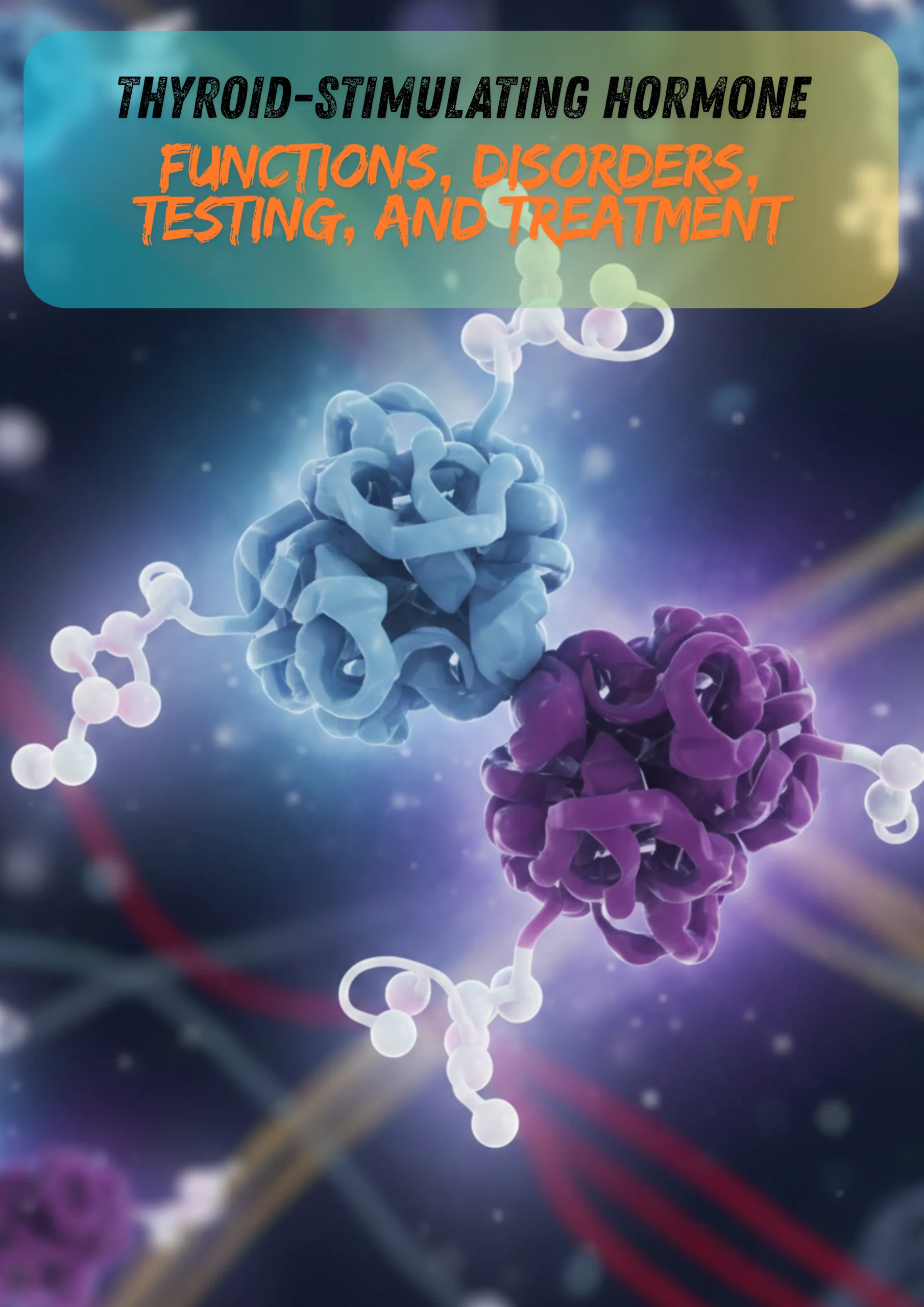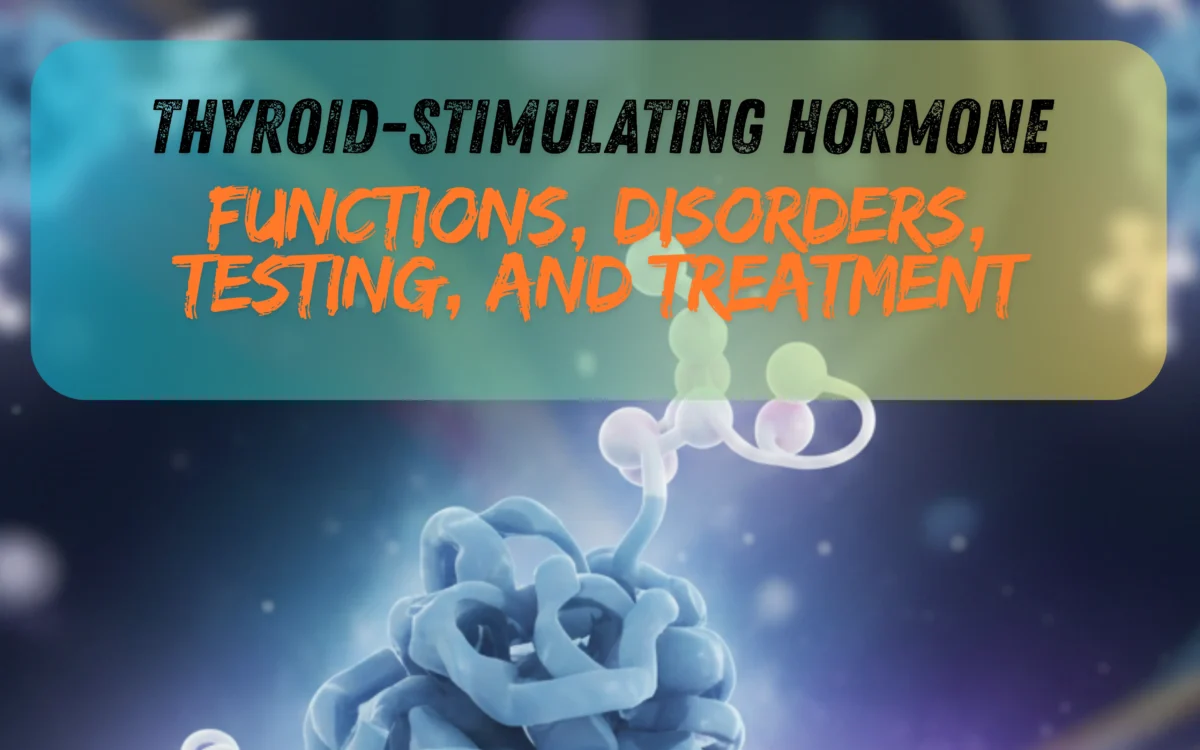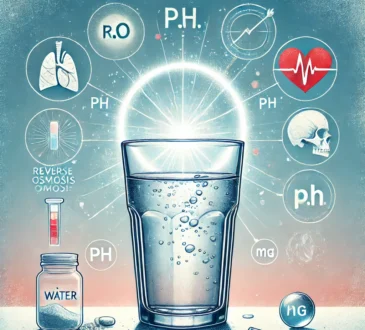
One essential hormone in the endocrine system that controls the thyroid gland’s activity is thyroid-stimulating hormone (TSH). Despite being produced in trace amounts, it has a profound effect on the body. The pituitary gland, a tiny but potent gland at the base of the brain, secretes TSH. Because it regulates the activity of multiple other endocrine glands, including the thyroid, the pituitary is frequently referred to as the “master gland.”
Hormones that affect growth, metabolism, energy production, and temperature regulation are produced by the thyroid gland, which is located in the front of the neck. By serving as a conduit between the brain and the thyroid gland, TSH makes sure that the body maintains the appropriate hormonal balance required for regular operation.
The Function of TSH in the Hormonal Control System
The HPT Axis (Hippothalamus–Pituitary–Thyroid)
The hypothalamus–pituitary–thyroid (HPT) axis is a sophisticated feedback system that controls TSH. Thyrotropin-Releasing Hormone (TRH) is produced in the hypothalamus, a part of the brain where this system starts. The pituitary gland releases TSH into the bloodstream in response to stimulation from TRH.
TSH stimulates the thyroid gland to produce two vital hormones after it is released.
a. T4 (thyroxine)
b. Triiodothyronine (T3)
In practically every cell in the body, these thyroid hormones control energy production and metabolism.
Negative Feedback Mechanism
When there is T3 and T4 in the blood these hormones send a signal to the hypothalamus and the pituitary gland. This signal tells the hypothalamus and the pituitary gland to make TRH and TSH. This process is called a Negative Feedback Mechanism of the thyroid hormones. It helps keep the thyroid hormones in balance. The Negative Feedback Mechanism of thyroid hormones makes sure that the thyroid hormones are not made much or too little. This balance is important for the thyroid hormones to work properly.
Major Functions of TSH
1. Regulation of Metabolism
The main job of TSH is to tell the thyroid gland to make thyroid hormones. These hormones control how our body uses food to make energy. TSH does this by affecting the thyroid gland. This is important because it helps with:
- Oxygen consumption
- Heat production
- Breaking down the food we eat like carbohydrates, fats and proteins
- How much energy we use
TSH is also important for Growth and Development. When we are babies, kids and teenagers thyroid hormones are necessary for us to grow normally and for our brain to develop properly. If we do not have thyroid hormones it can hurt our physical and mental development. TSH and thyroid hormones play a role, in this. The thyroid. Tsh work together to make sure we have enough thyroid hormones. This is crucial for TSH and thyroid hormones to do their job.
2. Cardiovascular and Nervous System Effects
The thyroid hormones that are controlled by TSH have an effect on the heart rate the blood pressure and how alert we feel. When TSH is working properly it helps with:
- heart rhythm
- Efficient digestion
- Healthy muscle function
- Emotional stability
The thyroid hormones have an effect on every part of the body so TSH has an indirect effect on the entire body.
High TSH Levels: Hypothyroidism
What Is Hypothyroidism?
When TSH levels are high it usually means that we have hypothyroidism. Hypothyroidism is a condition where the thyroid gland does not make thyroid hormones.
The thyroid gland and TSH have a role to play in this condition.
When the levels of T3 and T4 are low the pituitary gland makes more TSH to try to get the thyroid gland to work better.
Symptoms of Hypothyroidism
Hypothyroidism has a lot of symptoms. These include:
- Fatigue. People with hypothyroidism get tired easily.
- Weight gain. Hypothyroidism can make you gain weight.
- Cold intolerance. You may feel cold even when it is not that cold outside.
- Dry skin. Your skin may become dry and rough.
- Hair thinning. You may lose hair because of hypothyroidism.
- Constipation. It can be hard to have a bowel movement.
- Slow heart rate. Your heart may beat slowly.
- Depression. You may feel sad and depressed.
- Irregular menstrual cycles. Women with hypothyroidism may have problems with their periods.
If hypothyroidism is not treated it can become very serious. It can turn into a condition called myxedema which can be life-threatening.
Causes of Hypothyroidism
One of the causes of hypothyroidism is Hashimotos thyroiditis. This is a condition where the immune system attacks the thyroid gland. Over time this can damage the gland. Reduce hormone production.
Other causes of hypothyroidism include:
- Iodine deficiency. You need iodine to make thyroid hormones.
- Thyroid surgery. If you have surgery on your thyroid gland it can affect hormone production.
- Radiation therapy. This can also damage the thyroid gland.
- Certain medications. Some medicines, like lithium can affect the thyroid gland.
- Congenital absence of the thyroid gland. Some people are born without a thyroid gland.
Low TSH Levels: Hyperthyroidism
What Is Hyperthyroidism?
If you have TSH levels you may have hyperthyroidism. This is a condition where the thyroid gland produces many hormones. When there are many thyroid hormones it can suppress TSH production.
Symptoms of Hyperthyroidism
Hyperthyroidism has a lot of symptoms. These include:
- weight loss. You may lose weight without trying.
- Rapid heartbeat. Your heart may beat fast.
- Sweating. You may sweat a lot.
- Heat intolerance. You may feel hot even when it is not hot outside.
*. Irritability. You may feel nervous and irritable.
- Tremors. Your hands may shake.
- Frequent bowel movements. You may have a bowel movement often.
- Irregular menstruation. Women with hyperthyroidism may have problems with their periods.
In cases hyperthyroidism can cause a thyroid storm. This is an emergency.
Know the healing power of meditation
Causes of Hyperthyroidism
One of the causes of hyperthyroidism is Graves disease. This is a condition where the immune system overstimulates the thyroid gland.
Other causes of hyperthyroidism include:
- thyroid nodules. These are lumps on the thyroid gland that can produce many hormones.
- Thyroiditis. This is inflammation of the thyroid gland.
- Excess thyroid hormone medication. Taking much thyroid hormone medicine can cause hyperthyroidism.
Subclinical Thyroid Disorders
Subclinical Hypothyroidism
This is a condition where TSH levelsre high but the levels of other thyroid hormones are normal. People with hypothyroidism may not have any symptoms. Treatment depends on:
- How high the TSH level is
- The persons age
- Whether the person is pregnant
- Whether the person has any heart problems
Subclinical Hyperthyroidism
This is a condition where TSH levelsre low but the levels of other thyroid hormones are normal. It can increase the risk of heart problems and bone loss in older adults.
TSH Testing and Diagnosis
The TSH Blood Test
The TSH test is the test used to check thyroid function. It involves taking a sample of blood. The normal range for TSH is usually between 0.4 and 4.0 mIU/L. This can vary slightly from one lab to another.
Additional Thyroid Tests
If the TSH level is not normal doctors may order tests, such as:
- Free T4 test
- Free T3 test
- Thyroid antibody tests
These tests can help figure out what is causing the thyroid problem.
Special Situations: Pregnancy and Newborn Screening
During pregnancy thyroid hormones are very important for the babys brain development. If the mothers TSH level is not normal it can increase the risk of miscarriage or premature birth. That is why pregnant women who are at risk are often screened.
Newborns are usually tested for hypothyroidism soon after birth. If it is caught early it can prevent delays and intellectual disability.
Treatment of Hypothyroidism
Thyroid Hormone Replacement Therapy
The standard treatment for hypothyroidism is levothyroxine. This is a form of T4 that can help restore normal hormone levels. It can also lower TSH levels to a range.
When treating hypothyroidism doctors consider:
- How medicine to give
- How often to check the TSH level
- Whether the person will need to take medicine for the rest of their life
If taken correctly levothyroxine is safe and very effective.
Treatment of Hyperthyroidism
- Antithyroid Medications
- Medicines like methimazole and propylthiouracil can reduce thyroid hormone production. These are often used as the treatment.
- Radioactive Iodine Therapy. This treatment uses iodine to destroy overactive thyroid tissue. It is an effective treatment.
- Surgical Treatment . In some cases surgery may be necessary. This can involve removing part or all of the thyroid gland. It may be recommended for:
- goiter
- Suspicion of cancer
- Allergic reactions to medicine
After surgery or radioactive iodine therapy many people develop hypothyroidism. Need to take thyroid hormone replacement for the rest of their life.
Lifestyle and Thyroid Health
Getting iodine is very important for thyroid health. Iodized salt is a source of iodine. However much iodine can also cause problems.
Other things that can help include:
- Eating a diet
- Managing stress
- Taking medicine as prescribed
- Going to the doctor regularly
People should talk to their doctor before taking any supplements because some can interfere with thyroid function.
TSH and Pituitary Disorders
In cases abnormal TSH levels can be caused by problems, with the pituitary gland. If the pituitary gland is damaged it can cause hypothyroidism. This is a condition where the pituitary gland does not produce TSH even if the thyroid hormone levels are low. This requires medical attention and treatment.
The Thyroid-Stimulating Hormone plays a part in keeping our bodies working properly. It helps our brain talk to our thyroid gland so that it makes the amount of thyroid hormones. When the Thyroid-Stimulating Hormone levels are not right it can mean we have hypothyroidism or hyperthyroidism. These conditions can really affect how we feel physically and mentally.
We can find out if we have a thyroid problem by getting a blood test. Then we can get the treatment. Most people with thyroid problems can feel better. Live normal lives if they take their medicine and stay healthy. Knowing about the Thyroid-Stimulating Hormone helps us find out if we have a thyroid problem on. It also helps us take care of ourselves so that our hormones stay balanced. We stay healthy in the long run. The Thyroid-Stimulating Hormone is important, for our health so we should understand how it works and how it affects our bodies.





